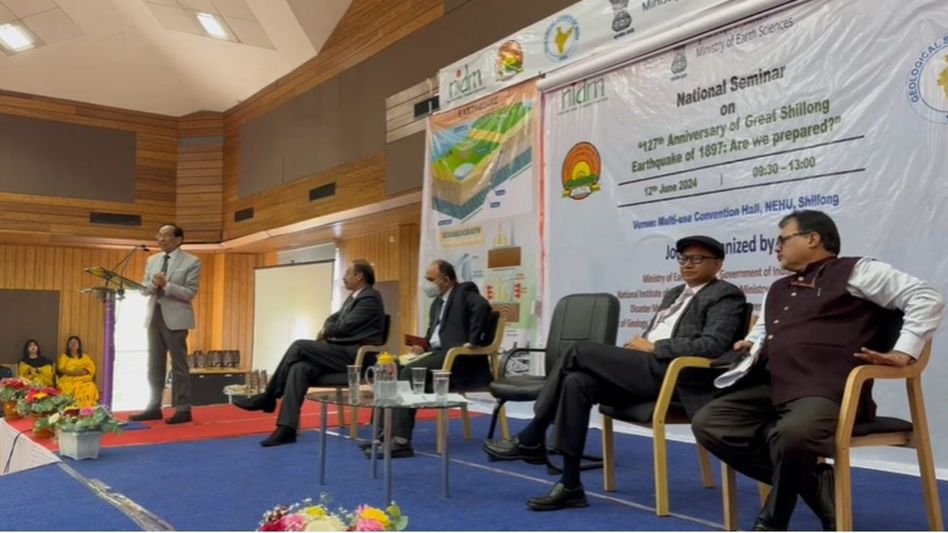Meghalaya experts warn of catastrophic impact if 1897 Shillong earthquake repeats
Experts in Meghalaya have raised alarms over the potential catastrophic impact of an earthquake similar to the 1897 Shillong quake if it were to happen today. A seminar at North-Eastern Hill University stressed the need for preparedness and resilient infrastructure to mitigate risks.
 Meghalaya experts warn of catastrophic impact if 1897 Shillong earthquake repeats
Meghalaya experts warn of catastrophic impact if 1897 Shillong earthquake repeatsA seminar on the '127th Anniversary of the Great Shillong Earthquake of 1897: Are we prepared?' held at the North-Eastern Hill University (NEHU) on June 12 highlighted the potentially catastrophic consequences if an earthquake of similar magnitude were to strike the region today.
According to Prof Devesh Walia of NEHU's School of Human and Environmental Science, seismologists have calculated that a repeat of the 8.7 magnitude earthquake at midnight could result in a minimum of 5 lakh lives lost, considering the present-day vulnerabilities and population density.
The Great Shillong Earthquake of 1897, which occurred at 5:11 pm, was the first recorded earthquake to break the Earth's crust surface, making it one of the most impactful seismic events. Despite most people being awake and outdoors at the time, the quake claimed 1,542 lives and reshaped the landscape of Shillong and its surroundings.
While such high-magnitude earthquakes are rare, experts emphasised the need for preparedness to reduce the level of devastation. Walia highlighted the ongoing efforts by seismologists to improve earthquake prediction and characterization, as well as the importance of adhering to building codes for constructing resilient infrastructure.
"The seismologists, they are working for better prediction, better characterizing the earthquakes. There are various building codes with which we need to construct, and this needs to be told to the people," Walia said.
The seminar delved into various aspects of post-earthquake management, including the development of disaster response plans, seismic hazard assessment, early warning systems, and community preparedness. Renowned geologists, seismologists, and disaster management experts shared their insights during the event.
Experts stressed the urgency of raising awareness and implementing effective mitigation measures to safeguard lives and minimise the potential catastrophic impact of a high-magnitude earthquake in the region.
Padmashri Prof Harsh K Gupta, Former Director of NGRI and President of the Geological Society of India, graced the occasion as the Chief Guest. In his address, Gupta acknowledged the inevitability of earthquakes but emphasised that effective mitigation and safety measures can significantly reduce their impacts. He urged everyone to learn from nations like Japan, which prioritise preparedness, and stressed the importance of observing June 12 as National Earthquake Day to promote awareness and responsibility.
The Guest of Honour, GK Kesari, ADG & HoD of the Geological Survey of India's North-Eastern Region, delivered an insightful inaugural address on the pressing issues surrounding Seismic Zone V, proposing effective mitigation strategies and techniques to enhance resilience against seismic events.
Dr OP Mishra, Advisor and Director of the National Centre for Seismology, highlighted the unpredictable nature of seismic events and emphasised the need for resilient infrastructure design to mitigate the increasing risk posed by population growth and industrialisation.
The seminar also featured a vibrant cultural dance performance and an educational skit on earthquake safety measures by the Department of Geology, NEHU. Further, a Geo-exhibition showcased various rocks, fossils, and space technology models, providing an opportunity for participants to learn from experts.
The event concluded with the declaration of the four participants selected to represent India at the International Earth Science Olympiad (IESO) 2024 in Beijing, China, after a rigorous training camp.
As the seminar commemorated the 127th anniversary of the Great Shillong Earthquake, it served as a sobering reminder of the region's vulnerability to seismic activity and the importance of proactive disaster risk reduction strategies.
Copyright©2025 Living Media India Limited. For reprint rights: Syndications Today









